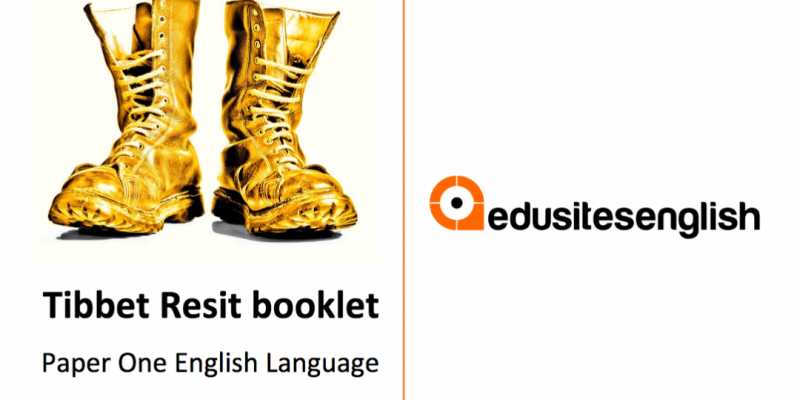

"Edusites English has been a game-changer for my classroom, providing expertly crafted resources that make teaching complex texts straightforward and enjoyable." "The revision guides and practice papers have given my students the confidence they need to excel in their exams, with noticeable improvements in their results." "Edusites English saves me so much time with its comprehensive lesson plans and study guides, allowing me to focus on what matters most—teaching and supporting my students." "The diverse range of materials, from text analysis to creative writing resources, keeps my students engaged and inspired in their English studies."
The Tibbets Paper 1 was sat in the Summer of 2018. The second of our feedback documents comes to you as a booklet which can be printed off for all of your students after sitting the exam for them to gain skills to apply in their next attempt. If your students create interesting responses to these papers please send them to us so we can share them with our members.
In addition to this exam booklet, Edusites English also has a similar and detailed feedback booklet for this exam series including;
Register now for our subject updates and FREE instant access to this article.
Already registered? Login below to continue reading this article.
GCSE English Language Exam Paper help from our expert Grainne Hallahan using a scientific method to get results! Like a juicy little nut that needs to be opened, the new Language paper landed in our inboxes in 2015, quite a different beast compared to its predecessor.
A sample section of Edusites English AQA Unseen Poetry Anthology. Includes an introduction around meaning, discussion points for the classroom and teaching tips for two poems. Top Examiner Tips look at what is required in answering unseen poems in terms of the assessment objectives, structuring a response, how to reference effectively and how to compare and contrast. Includes practice exam questions, using the poems, written as per AQA body structure and style.
In addition to these exam papers, Edusites has moderation videos, 360-degree analyses of how and why marks are awarded, for teacher and students to develop their skills.
Join Edusites English for AQA English Literature and English Language constantly evolving in collaboration with trusted teachers, specialists and academics, always with your classroom in mind. Edusites is renowned for subject expertise and targeted resources – including support for post-16 and resit teachers.
Of all the challenges in the English Language exam, question one fades into the background when compared to the complexities of question four, or the mental gymnastics for the analysis in questions two and three. Question one sits there. Unobtrusive. Inoffensive. Nonchalant. A little dream of a question, really. “Find four things…”. Can’t go wrong, right?
The language analysis in question two is a tricky little gem of a question. Most students feel pretty confident attacking this one, and usually even weaker students can pick up one or two marks. I’m going to split this into advice for those who are aiming for each separate ‘level’, because the advice I would give is quite different.
And now question three. You little tricky brute. It should be so simple! Teach structural devices, and how to analyse them, chuck in a couple of nice sounding technical terms to boost their confidence, and voila! Eight out of eight? NO.
What is the problem with question four? It should be as simple as teaching the difference between analysis and evaluation, point them in the right direction, and watch them go. But it isn’t.
As part of our new blogs series from teachers who are using Edusites in their classrooms we are delighted that Helen has shared her experience of sitting timed questions with students. There is something wonderful about sitting papers along with students, not least because it causes the classroom to be filled with a group dynamic of concentrated hush...
